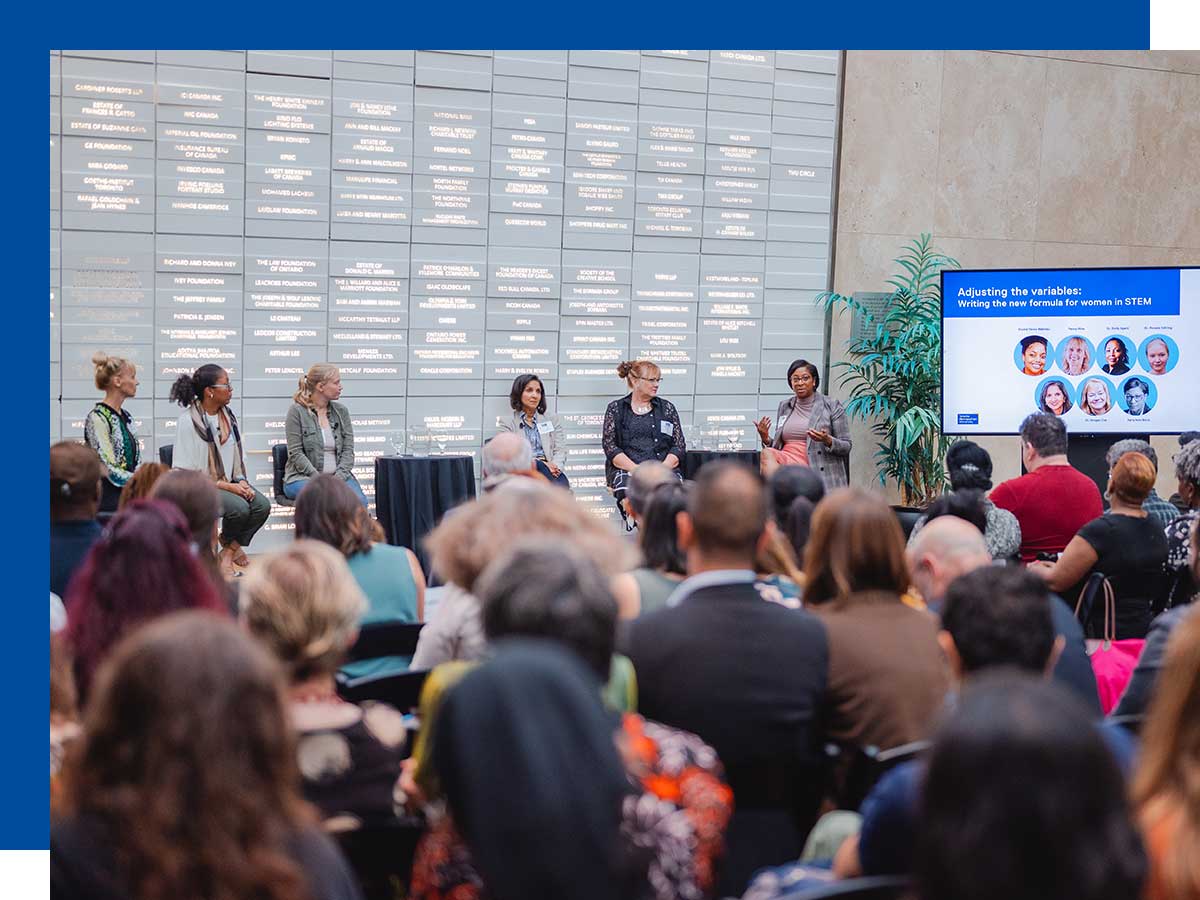5 takeaways from TMU’s Women in STEM event

On Oct. 4, leaders working in STEM gathered to discuss solutions for gender inequity in the field. From left: Penny Wise, Dr. Emily Agard, Dr. Roxana Sühring, Alice Thomas, Dr. Imogen Coe and Karla Avis-Birch.
Women represent 47 per cent of Canada’s workforce, yet they make up less than 25 per cent of people employed in careers in science, technology, engineering and mathematics (STEM). In addition, in 2022, only 23 per cent of all students in the engineering and architectural science programs at Toronto Metropolitan University (TMU) and just 15 per cent of students enrolled as science majors at the university identified as female.
To address this major gap, on October 4, female leaders in academia and the STEM sector gathered for a frank discussion, held at TMU’s George Vari Engineering and Computing Centre. The topic, “Adjusting the variables: Writing the new formula for women in STEM,” covered the changes needed to address the gender imbalance in STEM fields and how to chart a way forward for the next generation of women and girls.
The event, organized by the university’s Alumni Relations office, the Faculty of Science, and the Faculty of Engineering and Architectural Science, featured:
Emcee
- Krystal Henry-Mathieu (Graduate Student, Environmental Applied Science and Management, TMU; Founder, BLK Women In STEM)
Moderator
- Penny Wise (President, 3M Canada)
Panellists
- Dr. Emily Agard (Director of SciXchange, TMU)
- Karla Avis-Birch (Civil Engineering ’98; Chief Planning Officer, Metrolinx)
- Dr. Imogen Coe (Professor, Department of Chemistry and Biology, TMU)
- Dr. Roxana Sühring (Assistant Professor, Department of Chemistry and Biology, TMU)
- Alice Thomas (Chief Architect and Digital Technology Officer, Sun Life)
Here are five key takeaways from the event:
1) Introduce STEM to girls at an early age
Young girls, like all young children, are naturally curious and have a scientific mind from a very early age. There needs to be guidance to keep that door open, and family and parents are a really important component of that success. Sühring pointed out that, “Girls need to feel like they don’t have to break open the doors, but rather come from an environment where they already feel like it is a path for them.” Avis-Birch added that there needs to be greater representation of women at all levels of the industry and in the media, so girls can start making different choices early on.
2) Make roles more inviting to women
We need to showcase professions in STEM that are not in a lab so women can see there are different types of careers in the sector. Thomas suggested re-writing job descriptions to attract female candidates. For example, explaining that the candidate will be working with clients, have an impact on the bottom line or affect how the company runs, rather than just solely focusing on the technical aspects. Avis-Birch noted, “Women usually are looking for something that’s going to give back to their community and that’s going to give them a sense of purpose.”
In addition, Thomas said that women have to be part of the panels for interviews, and explained, “Women candidates need to see people who look like them in the interview process so they feel like they belong.”
3) Involve men as allies and advocates
Men need to be part of the solution. “All men need to be involved in creating inclusive, creative and supportive environments for women and provide training and skills to achieve that,” said Coe. She added that we need to do a lot more around healthy masculinities. “There is a well-established kind of ‘bro’ tech culture and engineering frosh culture, and it can be very exclusionary to women,” she said. “Male leaders need to step up and speak to these issues.”
4) Build your team
Women need to find a mentor (someone who can coach you and help you navigate the field), a sponsor (someone who speaks about you when you’re not there and thinks about you from a career perspective) and champions (people who are in your corner and advocating for you). “Stay connected to people to get you through tough times or to just be there for you,” Coe advised. “It doesn't have to be people in STEM, but it is a broader network of support.”
5) Manage “imposter syndrome”
Don’t shortchange yourself and remember all the things you have accomplished. “Remind yourself that you belong and deserve to be there,” Sühring said. Agard noted, “Seeking help is important because there are going to be times where you are struggling, but that’s okay because we all do.” She added, “Struggle is not necessarily a bad thing. So when you have that ‘imposter syndrome,’ know that you have your strengths, know that you belong there, but know that you don’t have to be perfect.”
Watch the full video recording of the event
To access other TMU Alumni event videos, webinars and podcasts, visit our Lifelong Learning page.